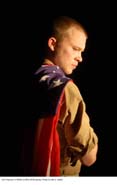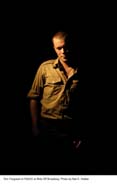
Paulanne Simmons
"Radio" Doesn't Make Waves
"Radio"
Directed by James Yeatman
59E59 Theaters
59 East 59th St., between Madison and Park avenues
Opened June 17, 2007
Tues. thru Fri. 8:30 p.m., Sat. 2:30 & 8:30 p.m., Sun 3:30 & 7:30
p.m.
$25 (212) 279-4200 or www.ticketcentral.com
Closes July 1, 2007
Reviewed by Paulanne Simmons June 20, 2007.
 |
| Tom Ferguson in RADIO at Brits Off Broadway. Photo by Neil E. Hobbs. |
"Radio," Al Smith's one-man-show, performed by Tom Ferguson and directed by James Yeatman, comes to 59E59 Theaters' Brits off Broadway festival after earning Smith the 2007 London Sunday Times Playwriting Award, and Ferguson the inaugural 2007 Timothy West Acting Award, as well as the 2007 Spotlight Award for Best Actor. This record certainly raises high expectations. But after seeing "Radio," some people may be left with one question: What were they thinking?
It's not that "Radio" is a terrible piece of theater, but rather that there's nothing particularly theatrical about the piece. Yeatman does his best to add drama to the discourse. He tries to give Ferguson something to do with his young, athletic body. But jumping around the stage and playing with a wooden chair are just not enough to turn this narration into a drama.
"Radio" is the story of a young man, Charlie Fairbanks, who was born on June 30, 1950, in the exact middle of the century, in the "forgotten little town of Lebanon, Kansas," the geographic center of the United States. As if this weren't enough claim to fame, each time the Fairbanks move, the country miraculously adds another state, first Alaska and then Hawaii, so that the family continues to live in the geographical center of the United States. It doesn't get more interesting than that.
Charlie appears to be telling his story to a girlfriend he's lost for some reason, so there is some passionate talk, but it's hard to make temperatures rise when one of the loving parties is absent from the stage. Smith also includes several events of the time, the assassination of John F. Kennedy, the Apollo Space Program ("Radio" is the first in Smith's trilogy of plays about America's space program, a trilogy inspired by his father's work for the Apollo Program in Washington, DC).
 |
| Tom Ferguson in RADIO at Brits Off Broadway. Photo by Neil E. Hobbs. |
Why the play is called "Radio" when Charlie was born and lived during the age of television and the events he narrates were all widely broadcast on the tube is impossible to figure out. Unless, of course, TV had not yet made its way to Middle America.
"Radio" plays out as a kind of coming-of-age story, beginning with the courtship of Charlie's father, a farmer turned flag maker, and his mother, a woman who hovers in the background without too much personality. Ferguson does a good job portraying the different characters and would have probably done a better job if they had something to say.
Radio is meant to represent a typical American life, filled with typical American values. Thank God such a person doesn't exit, and if he did it probably wouldn't be worth while writing or producing a play about him.
The language Smith uses is undeniable evocative at times. Phrases like "You said that the moonlight is our ancestors' way of showing us out of the darkness when we're lost" or "My memories of you are still spilling out into that darkness" can be moving. But "Radio" is not meant to be a poem.
Running for less than an hour, the play really doesn't
take enough time to get into Charlie's character, even if he had
much of one. Perhaps Smith ran out of material, or perhaps he is saving
what he has for his next two plays. If that is the case, he'd do
well to come up with something more stimulating than "Radio."

| lobby | search
| home | cue-to-cue |
discounts | welcome | film
| dance | reviews |
| museums | NYTW
mail | recordings | coupons |
publications | classified |